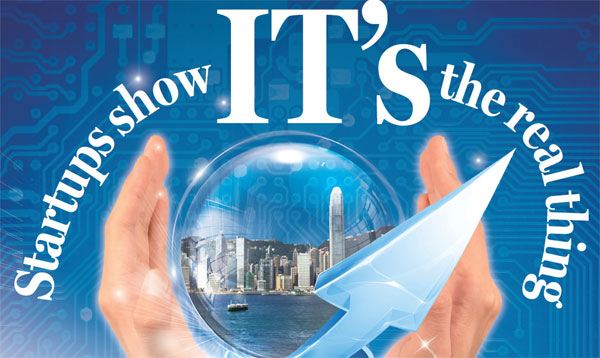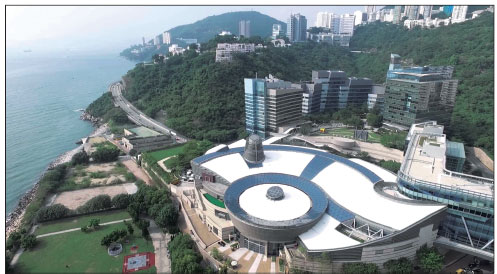Startups show IT's the real thing
Updated: 2015-11-30 07:58
(HK Edition)
|
|||||||||
Finally the city's much-cherished dream of having a robust startup ecosystem is beginning to materialize. Sylvia Chang reports.
Suddenly "innovation and technology" is the buzz-word in Hong Kong. The government, high-tech startup incubators, universities and institutions, and different technology-related private companies - everyone is talking about it. The seeds of the startup ecosystem, sown a while ago, seem to be blossoming at long last.
The trend of the city's IT talent moving to places considered more supportive of high-tech startups has reversed. Encouraged by the newly-launched government initiatives, talented, youthful entrepreneurs are showing more willingness to stay home. Trained technicians living abroad have shown an interest in bringing their own startup ideas to Hong Kong.
Hong Kong has some 1,558 startups registered this year, 46 percent higher than last year, according to Invest Hong Kong, the department of the SAR government responsible for foreign direct investment. Industry experts believe that the explosion of new startups assures Hong Kong's future in information technology innovation.
This month the government's Innovation and Technology Bureau (ITB) opened for business. Industry experts say it's a significant step forward in government efforts to diversify the local economy, which for decades has held the finance industry and property development in close embrace.
The role of Hong Kong as a "super-connector" in the arena of innovation and technology will soon explode, predicts Nicholas Yang, newly-appointed Secretary for the ITB. One of the bureau's main aims is to create closer collaboration between local and international innovation and technology institutions.
Yang says the promise of more research, development and business is already showing signs of success. Hong Kong's private sector, long averse to high-technology investment, is showing more interest in the field, and has started contributing large amounts of money. Alibaba is one example. The largest e-commerce company on the Chinese mainland declared high-profile support to Hong Kong startups on Nov 19, by providing a HK$1 billion fund for which technical talents may apply to develop their ideas.
There's also interest from abroad. Numerous international seminars and high-tech forums are planned. The Massachusetts Institute of Technology (MIT) plans to open its first overseas Innovation Node here next summer. The aim is to link the MIT community, Hong Kong and the neighboring Pearl River Delta, promoting innovation and new development through shared resources and close collaboration.
MIT's Hong Kong operation opens its doors to Hong Kong-based students and faculty, entrepreneurs, and businesses next summer. MIT plans to offer internship opportunities, educational programs, and innovation-focused events, all across the Pearl River Delta region.
MIT was attracted by many of the city's universities with established reputations in IT research and development. Another factor is the manufacturing capability across the border in Shenzhen.
"Manufacturers in Shenzhen have mastered the ability to take a prototype and take it from a single unit to hundreds overnight," says Professor Charles Sodini of MIT, who is expected to be named head of the Innovation Node. He said that is an asset that will help students and faculty of MIT to commercialize ideas through business startups.
Broadening horizons
The establishment of ITB generally is welcomed by the industry. The city's two startup incubators, Hong Kong Science & Technology Parks and Cyberport, are joining the effort, helping to underscore the city's renewed commitment to high technology.
At the kickoff event of this month's Global Entrepreneurship Week, Cyberport awarded prizes of HK$10,000 each to 10 teams who had submitted business proposals based on their high-tech ideas. Cyberport, which is fully government-funded, will also open its incubation portal to the winning teams.
Among the winners were Henry Chan Kwong-hing and his team, developers of "Optimor.io", a banking application that supports financial operations. It offers a secure environment that speeds up the process of dealing quickly and smoothly with customer enquiries.
Chan, a graduate in Information Engineering from the City University of Hong Kong, came up through Cyberport's entrepreneurship boot camp at Stanford Graduate School of Business in California. It gave him a chance to visit Silicon Valley, where he talked to young entrepreneurs.
"I was most impressed by the innovation atmosphere in Silicon Valley. Everyday there were heavyweights from big companies, in different industries coming and sharing their experiences," said Chan.
Cyberport has been nurturing startups since its establishment in 2000. This university partnership program, says Herman Lam, CEO of Cyberport, allows the community to "step up forward" to young people, even in their teens, to help nourish their creative ideas.
Hong Kong may lag behind Silicon Valley by a decade or more, in terms of offering support and encouragement to startups, but Lam has a positive outlook on the future of technology in Hong Kong.
"Culture and funds are two major initiatives that will promote this environment," Lam explains. He has observed signs of new enthusiasm. In the first half of 2015, Cyberport raised almost HK$200 million. That's equal to the amount raised in all of 2014. The fund, Lam says, will be used to launch cooperation programs among Hong Kong startups, overseas companies, and research universities.
Also, seven startups in Cyberport this year have raised more than $1 million - about HK$8.5 million each, whereas a few years ago even the most successful startup acquired only a few million HK dollars, according to Lam.


|
Cyberport in Hong Kong has been nurturing startups and helping nourish young people's creative ideas since it was set up in 2000. |
(HK Edition 11/30/2015 page9)
